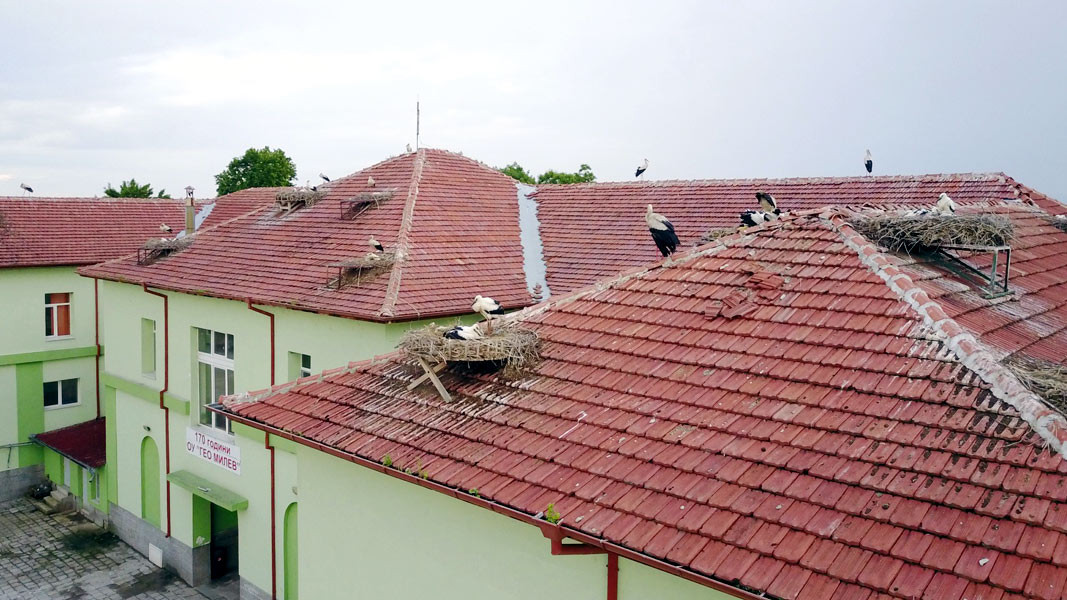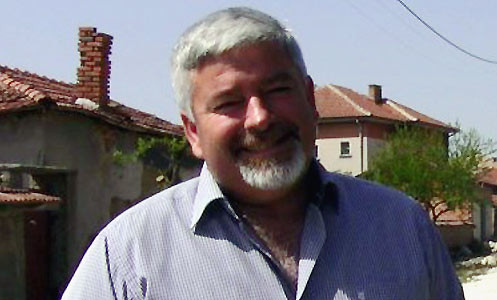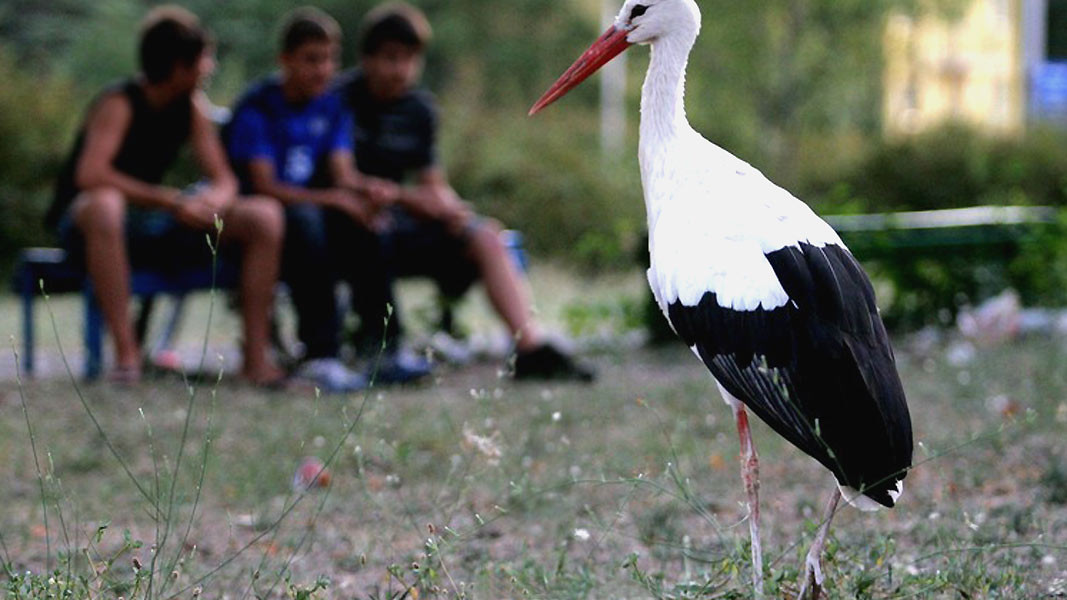Once, there was a giant tree in the village of Belozem (Central South Bulgaria). It was home of many storks. The tree whose stem could not be locked within twenty human palms and did not bend under the pressure of twenty stork nests was cut after the First World War. However, the birds continued to return to this Bulgarian village year after year and now they nest on the high roofs of the local church, school, community center and the utility power poles.

The village of Belozem launched a festival and a museum of white stork to pay tribute to this bird:
 The storks have been nesting in the marshy areas near Maritsa River and living in harmony with the village residents for centuries, the mayor of the village of Belozem Ivan Tachev told Radio Bulgaria. The local people have been growing rice for centuries in this area. That is why storks which are water birds and feed with snakes, frogs, lizards and insects are attracted by the rice plantations.
The storks have been nesting in the marshy areas near Maritsa River and living in harmony with the village residents for centuries, the mayor of the village of Belozem Ivan Tachev told Radio Bulgaria. The local people have been growing rice for centuries in this area. That is why storks which are water birds and feed with snakes, frogs, lizards and insects are attracted by the rice plantations.
On May 18 the residents of Belozem will be able to attend and enjoy the 14th White Stork Festival and thank the bird which brings them joy, good luck and love every spring. The festival will be held under the sign of the ecological tourism. Visitors will have the opportunity to see ethnographic collection and the exposition of villages part of the European Stork Village Network, to learn how a farm for California Worms and a garden for organic herbs are created, to look at the children’s diary of 20 stork families which chose the roof of the local school for their home and take a photo with a white stork family.
We organized an international student’s competition “The Life of a Stork”, Mayor Ivan Tachev went on to say. Belozem is a village of many artists and three of them will select the winners of the competition. We are planning other interesting events as well. The people will have the opportunity to use ecological transport of two horse-drawn carts and immerse in the atmosphere of Kisimovi Dupki Wetlands. Visitors can also buy local rice specialties, freshly made cheese, homemade rakia brandy, homemade wine, etc. However, we are not trying to make a profit, but to show what we produce in our village. Belozem is a clean village and although industry is well developed in this region, the storks still live here, which means that we have preserved our nature and our village is a good place to live.

The Green Balkans Federation and students from the primary school in Belozem are taking care of the storks. Children take notes when these birds arrive in the village and when they fly away. Recently, they started to broadcast online the life of a white stork family after they managed to buy a computer and a camera through charity bazaars.
The most important task of the adults is to teach their children to live in harmony with nature, Mayor Ivan Tachev said. We also have the task to teach them that we cannot live without nature and animals, because we are all children of this planet. Storks can be often seen walking few meters away from the children in the garden of the primary school. The birds are not afraid of the people, because nobody disturbs them.

Currently, a museum of the while stork is built in the village of Belozem with the assistance of the German foundation EuroNatur. The museum will display all exponents dedicated to these birds. It will have tourist information center as well.
Kisimovi Dupki Wetland is real oasis in the Thracian Valley where people can spend the night in a caravan and see many protected animals and birds, Mayor Tachev went onto say. We also have an ethnographic collection and two wonderful churches – Catholic and Orthodox. A tourist route takes people to the areas were storks find their food. This project will also finance the purchase of several bicycles which will be available to the tourists.

Once, people called this village Geren Köi – meaning a wet, marshy land. Its current name (Belozem – white soil) is due to the white color of the salty wet soil. However, once you go to that village, the first thing you will see is the red beak, the curious eyes and the white wings of the birds that coexisted with the local population for ages.
English version: Kostadin Atanasov
Photos: private library and kisimovidupki.comThe Bulgarian-American Cultural Association “Rosa” in Atlanta invited our compatriots to celebrate Easter today from 1:00 p.m. local time at Pinkneyville Park, Medlock Pavilion (the large pavilion) 4758 S Old Peachtree Rd Norcross, GA 30071...
Artist Vanya Petkova from Kardzhali paints non-traditional icons, depicting saints on ostrich eggs . She started about 15 years ago with images of Jesus Christ and the Virgin Mary. The first egg she painted is still intact and is kept by her relative...
This year, Orthodox and Catholic Christians will celebrate the Resurrection of Christ togethe r. On the same date, the entire Christian world will turn its gaze to the empty tomb and will try, to the best of its ability, to empathize with the amazement..
Cambridge Day 2025 - one of the leading events for English language teachers in Southeast Europe - takes place today at the Balkan Hotel in Sofia. For..
Students block the entrances to the Radio and Television of Serbia For 12 days now, students and citizens have been blocking the entrances to..
A new book "Bulgarian communities in Albania and Kosovo. Socio-political processes and demographic consequences (1913-2024)" was..

+359 2 9336 661
